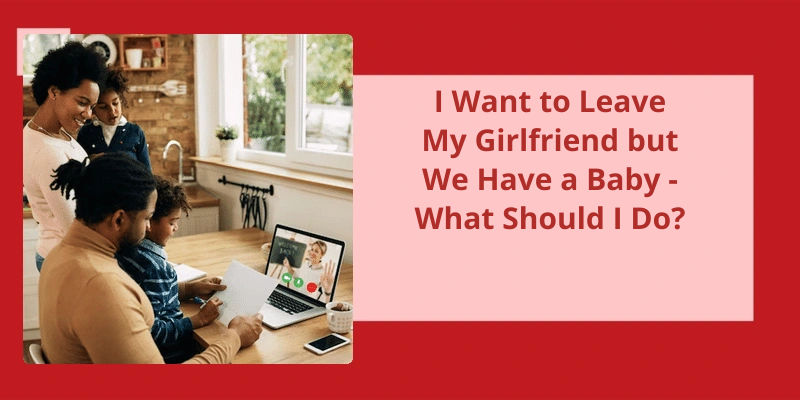The decision to end a relationship is always a difficult one, but when there are children involved, the stakes are raised even higher. This is a situation that many people find themselves in, and the stress and anxiety that come along with it can be overwhelming. Whether you’ve been with your partner for a few months or several years, the decision to leave can be fraught with emotional and practical challenges. In particular, for those with a baby, the prospect of separating can be especially daunting. There are often concerns about custody arrangements, co-parenting, and financial stability to consider. It's not a decision to take lightly, and all parties involved will need to approach it with care, compassion, and honesty.
How to Leave a Toxic Relationship When You Live Together and Have a Child?
Ending a relationship can be difficult, but leaving a toxic relationship when a child is involved can be even more challenging. If you live together with your partner and have a child, it might seem impossible to get out of the situation. However, with a little preparation, you can succeed in leaving a toxic relationship.
You need to plan things carefully to ensure your safety and the safety of your child. This may involve contacting friends or family members who can help you with your move, finding a new place to live, and gathering important documents such as your childs birth certificate and your partners personal papers. It’s important to have money saved up for rent and other expenses, as well as a plan for how you’ll support yourself and your child.
When it comes to breaking up, it’s crucial to end the relationship as civilly as possible. Don’t engage in arguments or fights, as this will only make things worse for you and your child. Try to communicate your decision calmly and respectfully, and set your boundaries firmly. It may be difficult, but it’s important to make it clear that the relationship is over and you’re moving on.
If you feel that you’re in danger or your partner is abusive, it may be necessary to take your child to a shelter. There are many resources available for women and children in abusive situations, and it’s essential to reach out for help. Remember, your safety and your childs safety come first.
When you break up with your partner, it’s important to be honest with your child about the situation. You don’t have to share all the details, but it’s important to let them know that the relationship isn’t working out and that you’re moving on. It’s also crucial to reassure your child that they aren’t to blame for the breakup. Make sure they understand that the decision was yours and your partners and that you both still love them.
Finally, seek support from friends, family, or a therapist. Leaving a toxic relationship can be traumatic, and you may need help processing the emotions and adjusting to a new life. If you’re struggling, don’t hesitate to reach out for help.
Coping Strategies for Dealing With Emotional Trauma During and After the Breakup
Coping strategies for dealing with emotional trauma during and after a breakup involve taking care of oneself, seeking support from others, engaging in activities that bring joy, and allowing oneself to feel and process emotions. It’s important to acknowledge the pain of the breakup but also to focus on self-growth and moving forward.
Conclusion
It’s important to approach the situation with sensitivity, honesty, and compassion for everyone involved. While it may be painful in the short term, prioritizing your own emotional well-being and the best interests of your child is ultimately the right choice. Seeking support from friends, family, or a therapist can help you navigate this transition and ensure that your child receives the love and care they deserve. Remember, it’s possible to co-parent successfully even if you’re no longer in a romantic relationship with their other parent.






